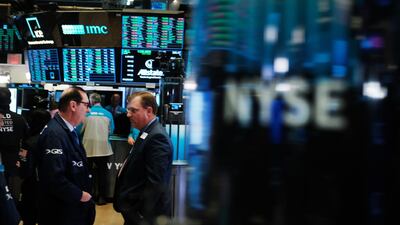The global stock slump and sharp rise in gold prices, on the back of escalating tensions between the US and Iran following the killing of one of the top generals of the Islamic Republic in Baghdad, may prove "temporary".
Qassem Suleimani, the head of Iran's Revolutionary Guard's foreign operations branch, the Quds Force was killed in a US rocket strike-ordered by US President Donald Trump on Thursday that prompted a knee-jerk reaction in both equities and gold markets, as investors looked for safer assets.
The S&P 500, the main equities benchmark in the US, dropped 0.7 per cent, its biggest loss in a month. Escalation in tensions in the Middle East evaporated the optimism that had pushed the S&P 500 Index to a record high on Thursday after a blockbuster 2019 and the news that US president Donald Trump is ready to sign a phase-one deal with China on January 15.
The Dow Jones Industrial Average fell 233.92 points, or 0.81 per cent, at the end of trading on Friday. The Nasdaq Composite index also dropped 71.42 points, or 0.8 per cent.
“Markets were seeking a catalyst for taking a break after the long run, and they got it,” Nathan Thooft, Manulife Asset Management’s head of global asset allocation told Bloomberg. “Unless the escalation is severe and repeated, I see this as a temporary scare. Obviously the risk is it delays the global recovery as well as dents sentiment and thus earnings.”
Most Asian stocks closed lower with Hong Kong’s benchmark Hang Send Index dipping 0.3 per cent. Though FTSE 100 Index in London rose 0.2 per cent to 7.622.40, Europe's broad STOXX 600 index fell as much as 1 per cent, but managed to pare losses to close down 0.33 per cent. Germany's DAX slumped 1.3 per cent.
MSCI's gauge of stocks across the globe declined 0.5 per cent, while its emerging markets index lost 0.4 per cent.
"Geopolitics has come back to the table, and this is something that could have major cross-asset implications," Salman Ahmed, Lombard Odier's chief investment strategist, told Reuters.
"What is critical is how it pans out in the next few days," Mr Ahmed said. "Whether it turns into a theme depends on Iran's reaction and then the US response."
The safe haven currency yen rose rose 0.5 a per cent against the dollar to a two-month high, while in commodities gold prices climbed to a four-month peak, racing past the key $1,550 an ounce level, as investors swapped riskier equities in their portfolios with safer assets.
Gold climbed 1.5 per cent to $1,552.20 per troy ounce and is expected to continue rising in the short term due to heightened tensions in the Middle East.
Zurich-based lender UBS, which expects gold price to move past $1,600 per troy ounce in 2020 said increasingly-negative US real interest rates and the broad-based weakening of the US dollar are also supporting factors for Golds rise in the future.
“A renewed rise in the Federal Reserve's balance sheet and the risk of more Fed rate cuts to support a slowing US economy tend to be supportive of precious metals,” it said.


